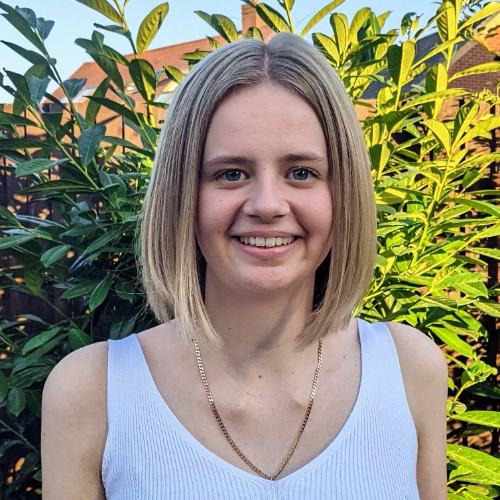"The Centre is unique because they give you a lot of freedom to go to conferences; they are always supporting you to help you become a real professional" - Joaquin

The CMRI PhD programme is unique because we are given the opportunity to get into the lab and do research using state-of-the-art equipment from day one. The research and academic staff are incredibly supportive and are real experts in their fields. During my PhD I have gained experience across a wide variety of experimental techniques, preparing me well for a career in academia or industrial research.
Eloise Lee
Science training
The topics below are an indicative list of subject areas you can expect to cover based on current teaching. The training is run on a biannual programme and is subject to change from year to year.
To ensure that you continue to develop your general scientific knowledge, we require you to attend a lecture course of your choice from within the Colleges of Engineering, Maths, and Physical Sciences in both your first and second years.
We do also expect our new PGRs to attend a new Metamaterials (ENGM016) module in the second term of their first year. This multidisciplinary module focuses on innovative materials that combine mechanical properties with unsusal chenical, optical or electromagnetic properties. These materials include, but are not limited to, nanomaterials, carbon-based and organic materials, hybrid materials and metamaterials. It investigates the applicaiton of these materials through research showcases in opto-electronics, energy harvesting and storage and wearables. It also covers the principles behind the behaviour of nanomaterials, nanofabrication techniques and advacned applications of nanostructured and nanoengineered materials, and the issues associated with the manufacturing and commercialisation of such materials.
The lecture course modules list may vary each year, so we will send you a current one as part of your induction. You will not be required to undergo the examination for these modules, but evidence of notes and problems should be contained within your training portfolio.
This acoustics course, led by Dr Tim Starkey, is run as a first primer for metamaterials and surface waves. Using guided reading and tutorial-style discussions, this course arms participants with some fundamentals of metamaterial physics.
By applying simple acoustic phenomena to demonstrate band gaps, surface waves, absorption, and resonances, we explore how these relate to different research themes across the Centre for Metamaterials Research and Innovation (CMRI).
Run by Prof Rob Hicken, this lecture course considers the static and dynamic properties of magnetic materials before surveying their applications and also some relevant measurement techniques used both in Exeter and beyond.
In Rob’s words, “There are many aspects to magnetic materials, but we will consider those that are most likely to be relevant to our CMRI doctoral students. We will adopt a conceptual approach while measurement techniques will be illustrated with examples from research carried out in Exeter. Some of the measurement techniques may even be useful to those not engaged in magnetics research."
This course, led by Dr Alex Powell, will introduce you to some of the key works and concepts in the vast field of microwave metamaterials and antennas. By the end of the course, you will be familiar with foundational works and concepts involving control over materials properties, surface waves, 2D & 3d metamaterials, and Antennas.
You will be given reading material each week to study beforehand, which we will then go over in the form of a guided discussion in the class, with some illustrative practical experiments
This training is run by Dr. Hong Chang and introduces SEM EDS, TEM EDS, XRD, CT and AFM.
Led by Dr Calum Willams and Dr Changxu Liu, this course is run over two lecture sessions and will cover light-matter interactions, surface plasmon polaritons, localised resonances, experimental realisation and the recent trends and advances in applications in these areas.
Being able to programme or use specific computational software is an essential skill for all scientists and engineers. To ensure you develop these skills you will work closely with your supervisors to access the training you will need during the course of your PhD.
Run by Dr Simon Horsley, this lecture course provides an introduction to the theoretical methods used to solve wave propagation problems.
In Simon’s words, “The subject of metamaterials is largely about doing stuff to waves. And all waves have a lot in common, be they ocean, acoustic, or electromagnetic. This course aims to teach some mathematical methods for solving the wave equation. The aim is that you can start to solve the theoretical problems in your research without being reliant on expensive ready-made commercial packages.”
Write About Science is a unique scientific writing workshop run by Mark Buchanan and Justin Mullins, whose joint experience includes writing and editing for Nature, New Scientist and the New York Times. Through lectures, exercises and one-to-one feedback, the course focuses on the fundamentals of good communication and how to use them to produce scientific papers of the highest quality.
Research and knowledge exchange
To provide a platform for experience exchange, we have a yearly PGR Presentation Conference for second and third year CMRI PGRs to present to all cohorts. This is an opportunity for students to learn about each other's projects as well as enhancing their presentation skills and providing support for each other in their professional development.
There are also various social activities for PGRs including an away day during induction week, movie nights and Christmas social. These are PGR-driven initiatives.
CMRI PGRs are expected to attend colloquia, talks and events during their PhD. There will be opportunities to attend CMRI, Physics or NEST colloquia, where national and international experts will present latest developments in the wider science community. Any of these events will be advertised by email and calendar invitations.
Our PGRS also have access the talks and events run by the UK Metamaterials Network (UKMMN) https://metamaterials.network/events

